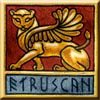
Malavisch is an Etruscan Goddess who is often seen in the retinue of Turan, the Etruscan Goddess of love. Malavisch Herself may be a minor Goddess of love and beauty Who watches over brides: on a famous Etruscan engraved mirror-back (circa 350 BCE) She is shown being made up and adorned by several other Goddesses, Who appear to be preparing Her for a wedding. Turan Herself overlooks the proceedings from off to one side, and holds what appears to be a myrtle branch, while a dove watches from Her shoulder. Malavisch is seated on a stool (the Greek variety with turned legs called a diphros), Her feet up on a small footstool, richly dressed and wearing lots of jewelry, and looking quite patient as the others attend to Her. Surrounding Malavisch are three attendant Goddesses or handmaidens: Zipu, perhaps an alternate form of Zipanu, who is fiddling with Malavisch's hair or fastening Her stephane (crown or headband); Hinthial, who is holding a mirror; and Munthuch, who stands before Her and who is either adjusting Her crown or applying makeup, as She is lightly touching Malaviskh's face and holding a brush or applicator in one hand. The idea that Malavisch is preparing for a wedding specifically, rather than any other special occasion, is indicated by several factors—besides the general theme of Love Turan brings by Her mere attendance, and the presence of Her dove and goose, She holds a sprig of myrtle. The Romans associated the myrtle with their Venus, and it had been an attribute of the Greek Aphrodite as well, with Whom the Etruscans were familiar. One species of myrtle was known as conjugula to the Romans, and Pliny surmises that the name refers to its use in the marriage ceremony. Below the main players, towards the handle of the mirror, are depicted a hen and rooster. The two are beak to beak, in the attitude of two cats saying hello by sniffing noses; and they are clearly male and female, for the rooster has a kind of ruff. The presence of a mated pair on the mirror hints at the sexual activities of the wedding night, and the stars and crescent moon in the background tell us the consummation is not far off. The name Malavisch means "softness" or "femininity" and is related to Etruscan malave, "to soften or exhaust". Malavisch may also be understood as a descriptive term rather than a name, and some believe that the Goddess on the mirror is actually Helen of Sparta, or as She was called by the Etruscans, Elinai, with the label "malavisch" referring to the preparations being made for the adornment of the bride. Alternate spellings: Malavisx |
|
|



